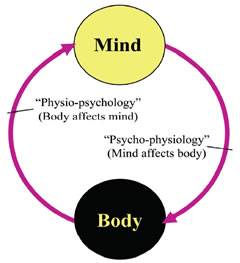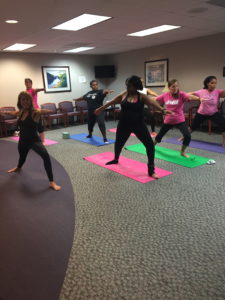I was truly honored to be invited to talk about Mind-Body Medicine at Sentara’s 25th Annual Critical Care and Trauma Symposium for nurses and guide some of the nurses through a “sunrise” yoga practice. When I was first approached, I was surprised because traditionally these critical care meetings focus on evidence based concepts for the critically ill patients, such as how to avoid infections, improve care of heart attack patients, etc. But after thinking about it for a minute, and then talking to Ashley (who invited me to speak), I realized that mind body medicine fits in perfectly.
Mind-Body Medicine is a medical discipline based upon the inseparable connection between the mind (which is not our brain, but our thoughts and emotions) and our physical health.
Unmanaged and overwhelming stress can turn into dysfunction and illness. So, we, the healthcare providers, need to embrace a holistic approach to our patients. The technological advances of the last century have been remarkable. No doubt, advancements in medical technology have allowed us to better diagnose and treat patients. Countless lives have been saved. But we are not meeting All the needs of our patients. As an interventional cardiologist, I am profoundly grateful for the technology at my hands which allow me to save lives and care for patients having a heart attack, acute heart failure, arrhythmias and cardiac arrest. But when I see them in the office a week or so after they’ve been discharged from the hospital, they are depressed, anxious and down right scared to death.
The use of complementary self-care modalities can help one manage stress and increase resilience. There is now significant evidence that mind-body therapies are beneficial in many medical situations, including heart disease. Mind-body therapies, in combination with conventional medicine, address the physical, emotional, and spiritual needs of patients. Such modalities include Yoga, Meditation, Relaxation, Art Therapy, Music Therapy, Dance Therapy, Taichi and Qigong.
These modalities can obviously be used by anyone & everyone for stress management and the prevention of illness. Stress does not affect only the sick. It affects all of us.
In the hospital setting, mind-body techniques can be utilized by 1) patients to reduce their pain and suffering, 2) family members to help them cope, and 3) healthcare providers to manage stress and increase empathy.
A little plug for my favorite mind-body therapy – Yoga. The popularity of Yoga has grown by over 50% in the last 8 years. According to the 2016 Yoga in America Study, 36.7 million Americans are practicing yoga with 80 million Americans likely to try yoga in 2016. One of the most common reasons for starting yoga was stress relief. So, my hope is that more Americans, and especially healthcare providers,will incorporate Yoga into their daily routines as a way to manage their stress and stay Healthy.
Nurses at Sentara’s 25th Annual Critical Care and Trauma Symposium-A foggy sunrise yoga practice with dolphins
Staff at Sentara Cardiology Specialists practicing yoga after work
Maybe, this will be the norm in a few years!
Namaste





